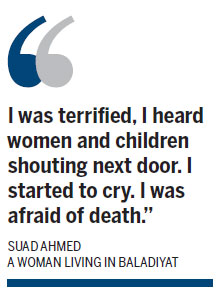Iraq serial suicide explosions claim at least 49 in Shiite areas
Ten car bombs exploded in predominantly Shiite Muslim areas in and around Baghdad on Sunday, while a suicide bomber attacked soldiers queuing up for their pay in northern Iraq, killing 49 people in total, police said.
There was no immediate claim of responsibility for any of the blasts, but Shiites are seen as apostates by hard-line Sunni Islamists linked with al-Qaida, which has been regaining momentum this year.
Soldiers and security personnel are also prime targets for Sunni militants seeking to destabilize Iraq's Shiite-led government.
Sunday's deadliest attack took place in the northern city of Mosul, when a man driving a car blew himself up outside a government bank where soldiers were waiting to collect their salaries, police said. Twelve people were killed.
A further 37 people died in apparently coordinated blasts in and around Baghdad. In the worst of those, two car bombs exploded moments apart near a busy market in the town of Nahrawan, south of the capital, killing seven.
"I was eating my breakfast when a powerful blast shook the building, shattering the window of my apartment and covering the dining table with pieces of glass," said Suad Ahmed, a woman living in Baladiyat, where another car bomb killed three people.

"I was terrified, I heard women and children shouting next door. I started to cry. I was afraid of death."
The wave of blasts, which hit eight different areas in and around the Iraqi capital, also wounded more than 90 people, security and medical officials said.
The surge in bloodshed this year, which has included sectarian attacks, has raised fears that Iraq may relapse into the intense Sunni-Shiite conflict that peaked in 2006 to 2007 and killed tens of thousands.
Analysts say the situation has been aggravated by the Shiite-led government's failure to address grievances of the Sunni Arab minority, which complains of political exclusion and abuses by security forces.
The authorities have made some concessions aimed at placating the protesters and Sunnis in general, such as freeing prisoners and raising the salaries of Sunni anti-al-Qaida fighters, but the underlying issues have not been addressed.
Al-Qaida was forced underground in 2007 and violence eased in the following years. But it is now on the rise again, with around 3,000 civilians killed so far this year, according to monitoring group Iraq Body Count.
Insurgents have exploited growing anger among Iraq's Sunni minority, which complains it has been marginalized under the Shiite-led government that came to power following the US-led invasion in 2003.
A raid on a Sunni protest camp in April touched off a violent backlash by militants that is still ongoing.
Relations between Islam's two main denominations have come under further strain from the civil war in neighboring Syria, which has drawn Sunnis and Shiites from Iraq and the wider region into battle.
Al-Qaida's Syrian and Iraqi affiliates merged earlier this year to form The Islamic State in Iraq and the Levant, which has claimed responsibility for attacks on both sides of the border.
Reuters-AFP
(China Daily 10/28/2013 page12)














